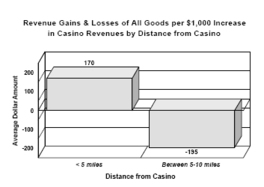None would disagree that casinos affect the economy. However, how casinos affect the economy has been a controversial and highly debated issue. In a recent study, Grinols & Omorov examined 1) what type of expenditures are affected by seven casinos in Illinois, 2) how far away these effects can be identified, and 3) the extent to which the effects are similar in different casino locations. Tax receipt data from the State of Illinois was classified into ten categories of expenditures; gains and losses were viewed in association with a $1000 gain in casino revenue. The study found that distances under 5 miles from the casino experienced an average gain of $170 in expenditures for all categories per $1000 increase in casino revenue. Distances within 5-10 miles from the casino showed an average loss of $195 for all expenditure categories. The authors cautiously conclude that general sales near casinos tend to rise at the expense of sales 5-10 miles away. In addition, casino revenues tend to replace spending on a broad range of goods rather than in one specific expenditure category. The authors state that regional economic development does not appear to be a reliable byproduct of establishing casino gambling in Illinois. Further research is necessary to determine the nature of this relationship and whether a similar pattern holds true in other geographical regions.
Source: Grinols, E.L., & Omorov, J.D. (Spring, 1996). Who loses when casinos win? Illinois Business Review, pp. 7-11, 19.
This public education project is funded, in part, by The Andrews Foundation.
This fax may be copied without permission. Please cite The WAGER as the source.
For more information contact the Massachusetts Council on Compulsive Gambling,
190 High Street, Suite 6, Boston, MA 02110.





